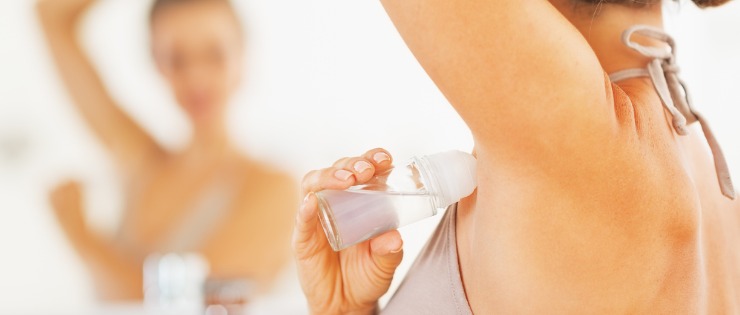
Applying deodorant before leaving the house is imprinted in most adults' brains. However, if you believe the rumours, then you’re risking your health every time you spray or rollover your armpits with an antiperspirant. But is there any scientific evidence to back these claims? The truth is, no, read on to find out why.
What the Research Tells Us About Deodorant
There have been plenty of stories published about the potential damage we’re doing to our health by using a daily antiperspirant or deodorant. There are links to everything from breast cancer, toxins that lead to cancer, Alzheimer’s Disease, altered microbiome, and kidney failure. But there has been no scientific evidence to prove the link between any disease or health condition and antiperspirant or deodorant.
Here we look at each of the myths that have been doing the rounds about your roll-on.
Myth #1: The Link Between Deodorant and Breast Cancer
Breast cancers are most commonly found in the outer upper part of the breast, close to the armpits. People questioned if the chemicals found in deodorants were causing breast cancer. Some believe women who apply antiperspirant or deodorant after shaving their armpits increase their risk because small cuts in the skin absorb more aluminium and chemicals. These toxins can clog the lymph nodes around the breasts and armpits and cause breast cancer.

Current Evidence:
Breast cancer is most likely to appear in dense breast tissue. This type of tissue is most difficult for doctors to detect abnormal and cancerous tissue on mammograms.
The chemicals in deodorant and antiperspirant are not responsible for causing any kind of cancer. French, European and American health authorities agree with an expert group that analysed 59 studies to find there was no link between deodorants/antiperspirants and breast cancer.
In another study of 1,606 women, there was no increased risk of cancer amongst those who shaved before applying deodorant or antiperspirant.
Lymph nodes in the armpits are also not to blame for breast cancer. While lymph nodes remove toxins, they leave the job of removing carcinogens to the kidneys or liver. Breast cancers start in breast tissue and spread to lymph nodes.
Myth #2: Link Between the Aluminium in Antiperspirants and Alzheimer’s Disease
In 1921 scientists made a link between aluminium poisoning and memory disorder. The possibility that aluminium causes Alzheimer’s Disease became known in 1965 when an injection of aluminium compounds into rabbits caused tangle-like formations in nerve cells. Antiperspirants contain active ingredients like aluminum salts, which dissolve into the skin's surface to form a temporary barrier between sweat ducts and the flow of sweat to the skin's surface.
Current Evidence:
The non-metallic form of aluminium is everywhere in the environment, naturally occurring in the foods we eat, the water we drink, drugs, cosmetics, and air we breathe. However, little of the aluminium we’re exposed to is absorbed in the body as our kidneys flush most of it out.

Experts have since suggested that experiments on animals that involve the brain are not reliable. The human brain is different to that of animals and neurofibrillary changes in aluminium-intoxicated animals are different from those in people with Alzheimer’s Disease.
Other researchers have found there is no significant difference between aluminium levels in people with Alzheimer’s Disease and age-matched controls.
Experts also believe our skin is an excellent barrier at keeping out any nasty ingredients like aluminium. The small amount of aluminium in an antiperspirant is nothing compared to the amount of aluminum we consume each day in our food.
Myth #3: Deodorants/Antiperspirants can Cause Kidney Failure
A link between aluminium and kidney problems was made when doctors gave dialysis patients a drug to help control high phosphorus levels in their blood. With poor kidney function, their bodies weren’t able to remove the aluminium fast enough, and it began accumulating in the kidneys.
Current Evidence:
The kidneys remove waste from the human body including aluminium and when the kidneys aren’t functioning properly, waste products including aluminium can build up to unsafe levels.
The Food and Drug Administration requires antiperspirants carry a warning “Ask a doctor before use if you have kidney disease.” The warning is for people who have kidneys functioning at 30% or less which is stage 4 or 5 chronic kidney disease.
Anyone who isn’t suffering from chronic kidney disease can’t absorb enough aluminium through the skin that it can cause any harm to their kidneys.
Myth #4: Antiperspirants Stop you Sweating Out Cancer-Causing Toxins
The human body is very good at excreting harmful toxins, naturally. There is a theory that if we don’t allow the body to sweat naturally and use antiperspirants to absorb sweat, our body can’t release the dangerous toxins.
Current Evidence:
The body doesn’t release these harmful toxins through sweating, the body is designed to excrete them through three major organs, the liver, kidneys and colon. Therefore, using antiperspirants won’t inhibit the body’s ability to discard toxins.

Myth #5: Deodorant and Antiperspirants Destroy Microbiome
In recent years more people are aware of their skin flora, also known as the microbiome. Gut and skin microbiome comprises trillions of microbes, bacteria and fungi. Good gut microbiome keeps our immune system healthy and controls digestion. There is also a link between gut and brain health. Some people believe using deodorant or an antiperspirant can adversely alter our natural ecosystem, making us more vulnerable to illness and disease.
Current Evidence:
There is no evidence to suggest that either deodorant or antiperspirant will cause problems with your microbiome. Sure, research shows deodorant and antiperspirant use kills bacteria and rearranges the microbial ecosystem of your skin, but it’s not yet known if this is beneficial or harmful.
How the Human Body Sweats
Our nervous system controls our body’s ability to sweat. The hypothalamus in the brain contains thermosensitive neurons which control the body’s core temperature. Neurons in the brain send/receive signals from the skin’s temperature receptors which then tell the sweat glands to turn on or off. Evaporation of sweat on the skin is what keeps us cool.
While sweat doesn’t have an odour, it smells when mixed with bacteria. And there’s no shortage of bacteria in our warm, dark, moist armpits. This combination of sweat and bacteria causes body odour.
Types of Sweat Glands
There are two types of sweat glands in the human body - eccrine glands and apocrine glands. The eccrine glands open to the skin and make a range of minerals including sodium, potassium, chlorine as well as sugar, urea and ammonia that are excreted by the sweat ducts. The apocrine glands merge with hair follicles under the skin’s surface. Apocrine glands are located in the armpits, groin and scalp where they release sweat, fatty acids and proteins.

Excessive Sweating
Some people experience excessive sweating not just underarms but also their hands, feet and face. Around 3% of the Australian population suffers from hyperhidrosis, the medical term for excessive sweating.
Sufferers experience wet clothing, body odour and social embarrassment when they need to shake hands or work near others. Some will opt for oral medications, Botox or even surgery to reduce the amount they sweat. Others rely on clinical formula antiperspirants and deodorants to stop their sweat glands from overproducing. These antiperspirants have a higher aluminium content than standard antiperspirants to reduce the wearer’s ability to produce sweat.
People who can’t sweat have a condition called anhidrosis while those in hot weather or a spa may stop sweating temporarily which is known as hidromeiosis.
Difference Between Deodorant and Antiperspirant
Deodorant works by killing the bacteria found in our armpits. The ingredients in deodorants are alcohol based, acidic and include fragrances to disguise the smell of sweat.
Antiperspirant works by preventing sweat glands from releasing as much sweat. The active ingredient in antiperspirants is aluminium. Some people prefer deodorant over antiperspirant and vice versa while others look for a two-in-one product which both stops the sweat and kills the bacteria.
Ingredients in Antiperspirants
To stop the body sweating, antiperspirants use aluminium based compounds including aluminium chloride, aluminium chlorohydrate or aluminium-zirconium compounds. These ingredients act as a plug on the skin to stop secreting sweat.
Rise in Popularity of Natural Products
Over the past decade people have become more conscious of the chemicals they’re exposed to during everyday living. Some people have stopped using the supermarket, bought cleaning products and moved to natural ones their grandmother used like vinegar and bicarb soda. Microfibre cloths have made it possible to clean surfaces in the home with water only.

People have made a conscious decision to reduce the number of chemicals they ingest by buying organic fruit and vegetables that aren’t sprayed with pesticides. They choose to make their own food from scratch as grandma did rather than eating processed foods containing preservatives, artificial colours and flavours.
Consumers are also looking at the products they use on their body. Cosmetics, shampoos, body washes use a range of chemicals to increase the life and effectiveness of the product. Natural body products including deodorants and antiperspirants have grown in popularity.
How Do Natural Deodorants/Antiperspirants Work?
Some people will argue natural deodorants don’t work. They could still smell their offensive BO and they gave the product the heave ho while others swear by them.
Manufacturers of natural deodorants have tried a range of products to find the one that stops the stink. Natural deodorants may use cornstarch, clay, baking soda, eucalyptus, aloe, coconut and essential oils, and eucalyptus to help absorb the moisture and reduce odour-causing bacteria.
So, Should You Be Worried?
Scientists have stated that no study has effectively backed the above claims, and more clinical trials on humans are needed to provide concrete scientific evidence. However, deodorants do contain a range of toxic chemicals and antiseptics (most of these products deactivate when they come in contact with the skin). So using a natural deodorant that works well for you and doesn’t contain harmful chemicals is worth a try, any attempt to reduce your chemical intake is always optimal.